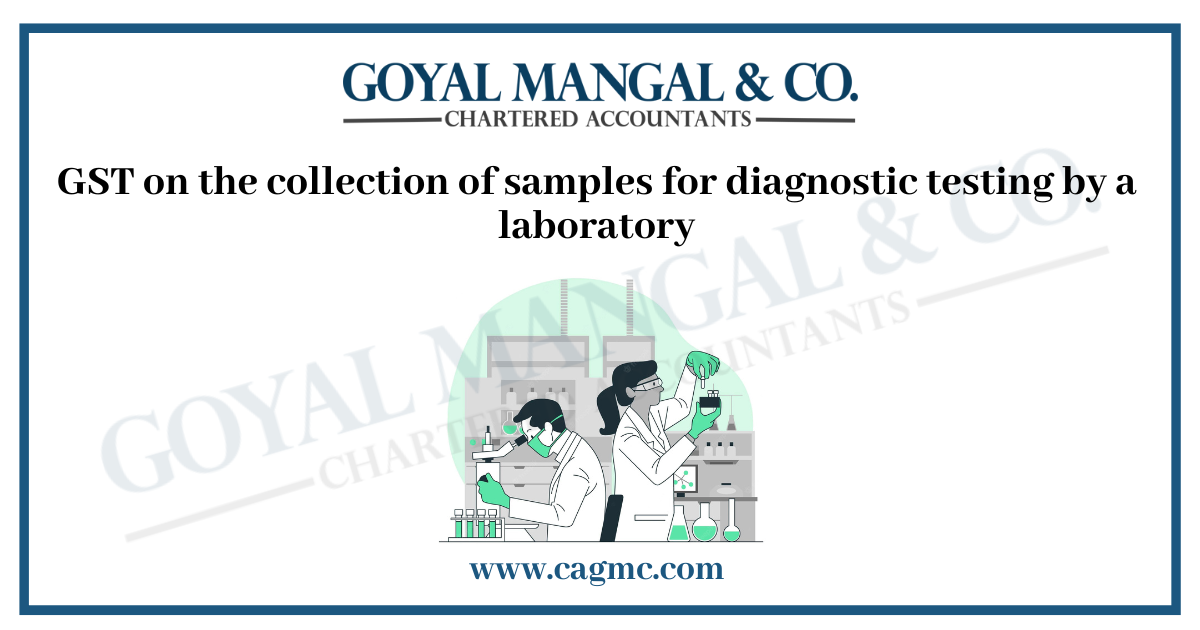
Are sampling services for laboratory diagnostic testing exempt from GST? The collection center has no laboratory. Collects samples from patients and deliver them to the laboratory for testing. There are two different approach exists that is presented by our Hon’ble Supreme Court of India, which says that, when the activity of a collection agent for a laboratory collecting samples so that the laboratory may do diagnostic tests on them cannot be viewed as a health care service (diagnosis), but rather as a business support function and will be subject to GST. However, if the patient and the collection centre engage into a service agreement and the collecting agent issues the test result in its name, the service supplied by that entity would constitute a health care service (diagnostic) and be exempt from GST.
Let us discuss the GST on collection of samples by pathology labs.
| Table of Content |
Meaning of Healthcare Services
Healthcare services mean diagnosis, treatment, or care of disease, injury deformity, abnormality, or pregnancy in any recognized system of medicine in India. For any service to be considered a Healthcare Service, the nature of these activities should be either “diagnosis”, “treatment”, or “care”. The definition does not specify whether the mere collection of a human sample for diagnostic testing is a health service. Since the final test report is issued to the patient by the laboratory, it is the laboratory that provides the healthcare (in this case, diagnostic testing) to the patient, and the collection agent provides business support services to the laboratory in performing the diagnostic tests.
GST on Healthcare Services
Most medical, hospital, and medical services are exempt from GST. Healthcare provided by a clinical facility, licensed general practitioner, or paramedic is exempt from GST. Veterinary clinic services related to the health care of animals or birds are also exempt from GST.
Services provided by cord blood banks by way of stem cell preservation or any other service related to such preservation are exempt from GST.
Services provided by way of transporting a patient in an ambulance are also exempt from GST.
The GST Rate for services has a universal clause that mentions that unless the service is expressly exempted from GST or the GST rate for the service is not expressly fixed, the 18% GST rate will apply. Therefore, some of the above services that are not provided by a clinical facility or an authorized doctor or paramedic could be subject to GST.
Goods and Service Tax Slab Rates
The GST Council has introduced the GST rate for goods and services to create a uniform tax rate across the country. After the implementation of GST, the Council has linked all services with the Service Accounting Code (SAC Code) to classify the services. The Service Tax Department will use the SAC codes to assess tax on services availed. GST on goods, on the other hand, is levied based on the HSN code, an internationally accepted classification methodology for goods on import and export. The GST rate for services falls below 0%, 5%, 12%, 18%, or 28%.
SAC Codes
Services Accounting Codes (SAC Codes) 999316 is used for medical laboratory and diagnostic imaging services under GST classification. SAC (Services Accounting Code) is used to identify the service. This service falls under the heading of Health and Social Care Services.
GST exemption on Clinical Facility
Any treatment or diagnosis or care of any disease, injury, deformity, abnormality, or pregnancy by a clinical facility is covered under this exclusion. Licensed medical practitioners in any recognized medical field such as private practitioners (physicians), and physiotherapists are also exempted from service tax. The term para-medico is not defined in the law. However, the Education Guide clarified that paramedics are trained healthcare professionals, such as nursing staff, physiotherapists, technicians, laboratory assistants, etc. Their services in a clinical facility would be the responsibility of the employee and would not be provided in an independent capacity and would thus be considered services such as clinical facility.
Similar services in a separate capacity are also exempt. Such treatment or care of the patient can be in any recognized system of medicine in India like allopathy, naturopathy, Ayurveda, homeopathy, or Unani. These drug systems are recognized in terms of clause 2(h) of the Clinical Facilities Act, 2010. Any other system of medicine which may be recognized by the Central Government is also eligible for this exemption. However, it does not include hair transplantation or cosmetic or plastic surgery, except when such surgery is performed to restore or reconstruct anatomy or bodily functions affected by birth defects, developmental abnormalities, injury, or trauma.
The clinical facility would mean any hospital, nursing home, clinic, sanatorium, or any other institution by whatever name. It can be a place established as part of a facility or any private diagnostic center such as an X-ray clinic, a pathology laboratory, or any diagnostic or examination center.
Judicial opinion on GST on sample collection by a Laboratory
The Constitution Bench of the Hon’ble Supreme Court of India in one of the landmark cases of Commissioner of Customs (Import) Mumbai versus M/s Dilip Kumar and Company and Ors held that the exemption notification should be strictly construed. If there is an ambiguity in the exemption notification which is subject to strict interpretation, the entity/assessee cannot claim the benefit of such ambiguity and it has to be interpreted in favor of the revenue.
Given the aforesaid judgment and the aforesaid consideration, the activity of collection of samples by a collection agent for a laboratory so that the laboratory can carry out diagnostic tests on it cannot be understood as a healthcare service (diagnosis) but a business support service provided to the laboratory and hence will be subject to GST. However, if a contract for the provision of services was concluded between the patient and the sampling center and the test protocol was issued by the sampling agent in his name, the service provided by him would be equivalent to health care (diagnosis) and would therefore be exempt from GST.
Final Words
As we know GST is one single tax system that includes various taxes. Notably, in the earlier law, the healthcare sector was subject to about eight taxes, which are now consolidated into a single GST. This makes it easy to do business in healthcare. In short, the implication of GST has an overall positive impact on the healthcare sector and after GST, the Healthcare Sector is contributing more to the economic development of India.


